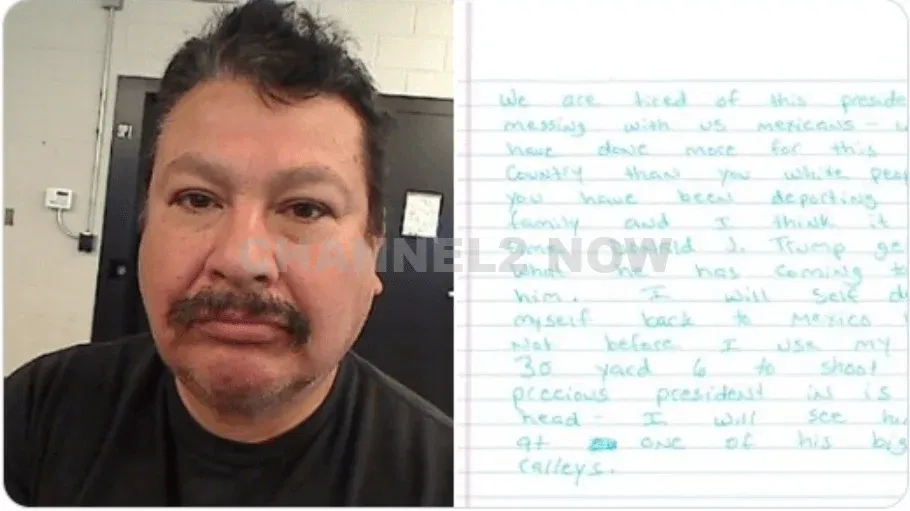Ramon Morales Reyes, a 54-year-old Mexican national, is at the center of a rapidly evolving federal case that has gripped national attention and heightened security discourse surrounding former President Donald Trump. On Wednesday, the U.S. Department of Homeland Security (DHS) released a statement confirming that Morales Reyes had been taken into custody after allegedly issuing a direct threat to assassinate Trump at a future campaign rally. The nature of the alleged threat, combined with Morales Reyes’ complex immigration history and the volatile political climate of the United States, has cast a spotlight on both domestic extremism and immigration enforcement.
According to DHS, Morales Reyes composed a handwritten letter addressed to a U.S. Immigration and Customs Enforcement (ICE) officer, declaring his intention to “shoot your precious president in [his] head” at one of Trump’s rallies. The letter’s menacing tone and explicit threat prompted swift federal action. The message also referenced Morales Reyes’ apparent rage over U.S. immigration policies, claiming the government had deported members of his family, though the letter did not name any individuals. DHS confirmed portions of the letter’s content, including a charged line stating, “We are tired of this president messing with us Mexicans – we have done more for this country than you white people.”
The explicit language of the threat, particularly its racial and political invective, has triggered considerable concern among national security officials. Secretary of Homeland Security Kristi Noem responded in an official statement, emphasizing the urgent need for more responsible rhetoric across the political spectrum. “All politicians and members of the media should take notice of these repeated attempts on President Trump’s life and tone down their rhetoric,” Noem stated. Her remarks reflect the broader unease gripping federal agencies, particularly in light of recent violent incidents directed toward political figures.
This is not the first time in recent memory that former President Trump has been targeted. In 2024, while campaigning for the Republican nomination, Trump narrowly escaped harm during an attempted shooting at a rally in Butler, Pennsylvania. That incident, one of two known assassination attempts from that year, also involved American citizens. In contrast, Morales Reyes’ case introduces a new dimension—an alleged foreign national, with a long-standing record of illegal entries into the U.S., becoming entangled in an act of domestic political violence. The convergence of immigration enforcement and presidential security elevates the stakes of the ongoing investigation.
Morales Reyes is currently being held in ICE custody in Wisconsin, pending deportation proceedings. DHS reported that he has unlawfully entered the United States on at least nine separate occasions between 1998 and 2005. His repeated border crossings and evasion of law enforcement illustrate enduring challenges in border security. Moreover, his criminal history extends beyond immigration violations; it includes a felony hit-and-run and other unspecified prior offenses. Such a background further complicates his legal standing and adds gravity to the current accusations.
While deportation proceedings move forward, federal authorities are continuing to investigate the threat in detail. It remains to be seen whether Morales Reyes will face additional charges beyond those related to immigration, such as federal charges pertaining to threats against public officials. The investigation’s scope likely includes forensic analysis of the letter, assessments of potential accomplices, and evaluations of Morales Reyes’ psychological and ideological motivations.
Experts in political extremism and immigration law suggest that this case highlights overlapping systemic vulnerabilities. The persistence of unauthorized border crossings, the emotional toll of deportation on families, and the inflammatory political climate create an ecosystem where extremism can thrive. The language in Morales Reyes’ letter reflects deep resentment toward perceived systemic injustice and alienation—elements frequently identified in risk assessments of lone-wolf actors.
The legal ramifications for Morales Reyes are potentially severe. While deportation may be the immediate outcome of ICE custody, the threat against a former U.S. president carries with it the possibility of federal criminal charges, including making threats against a former president, an offense that is vigorously prosecuted by the U.S. Secret Service and Department of Justice. The combination of Morales Reyes’ past offenses and the nature of this latest accusation could ensure a prolonged legal battle.
The incident also has political implications. As former President Trump remains an active and influential figure in American politics, currently campaigning for another term, any threat against his life—regardless of the source—reverberates nationally. DHS’s response and Secretary Noem’s comments are likely calculated to both reassure the public and signal heightened vigilance. The agency’s call for tempering political rhetoric is notable in a climate where incendiary discourse has often blurred the line between free speech and incitement.
Immigration policy remains one of the most divisive issues in American political discourse. Morales Reyes’ stated grievance over family deportations, while not corroborated by DHS in detail, points to the human cost embedded in immigration enforcement. While unauthorized entry into the U.S. is a federal crime, it is often motivated by desperation, family reunification, or economic necessity. When these motivations intersect with radicalized sentiments, as in this case, the result can be volatile.
From 1998 to 2005, Morales Reyes reportedly crossed the border nine times unlawfully. This period corresponds with heightened immigration debates during the George W. Bush administration, when border control measures such as Operation Gatekeeper and Secure Fence Act were beginning to redefine U.S. border policy. These historical measures aimed to deter illegal crossings but often resulted in repeated cycles of deportation and re-entry, particularly among migrants with strong family ties in the United States.
The location of Morales Reyes’ current detention—Wisconsin—is notable, as it is far from the U.S.-Mexico border. This indicates the extent of federal law enforcement’s reach and suggests that Morales Reyes was not apprehended during a border crossing but rather as a result of targeted investigative work. The interstate nature of the investigation also reinforces the seriousness with which federal authorities are treating the threat.
In the broader context of political violence, threats against presidents and former presidents are not unprecedented but have seen a disturbing uptick in recent years. The Secret Service, which is tasked with the protection of current and former presidents, operates with the mandate to investigate all threats seriously. The Morales Reyes case, like previous incidents, is a reminder of the persistent risk posed by individuals who believe that violence is a legitimate form of political expression.
Public reaction to the incident has been swift and polarized. While many have condemned the threat unequivocally, others have seized on the case to further entrench their positions on immigration, either citing it as evidence of systemic failure or cautioning against conflating one individual’s actions with broader immigrant communities. This polarization mirrors the current American sociopolitical landscape, in which events are frequently interpreted through ideological lenses.
As the investigation unfolds, legal analysts anticipate that the government will weigh the balance between immigration enforcement and criminal prosecution. Morales Reyes’ documented history of border violations and his felony conviction provide a strong legal basis for deportation. However, the severity of the alleged assassination threat may compel prosecutors to pursue federal charges, especially if additional evidence emerges linking Morales Reyes to planning or logistical efforts beyond the threatening letter.
The DHS and ICE have reaffirmed their commitment to national security, with officials noting that threats against former or current U.S. presidents are a red line. In parallel, civil liberties advocates will likely monitor the case closely, especially regarding due process rights in the deportation proceedings and any subsequent criminal trial. Given the inflammatory nature of the letter, ensuring a fair and transparent process will be essential to maintain public trust.
At its core, the arrest of Ramon Morales Reyes underscores the volatile intersection of immigration, political extremism, and security in the United States. The consequences of this case will likely extend beyond legal outcomes, influencing public discourse, policy deliberations, and electoral dynamics. Whether as a symbol of policy failure or a call for measured enforcement, the Morales Reyes case is a microcosm of the broader tensions facing the nation.
For now, Morales Reyes remains in custody, his fate tied not only to his past but to the broader national reckoning over the dangers of unchecked political rage, the complexity of immigration enforcement, and the enduring vulnerability of democratic institutions.


Leave a Reply